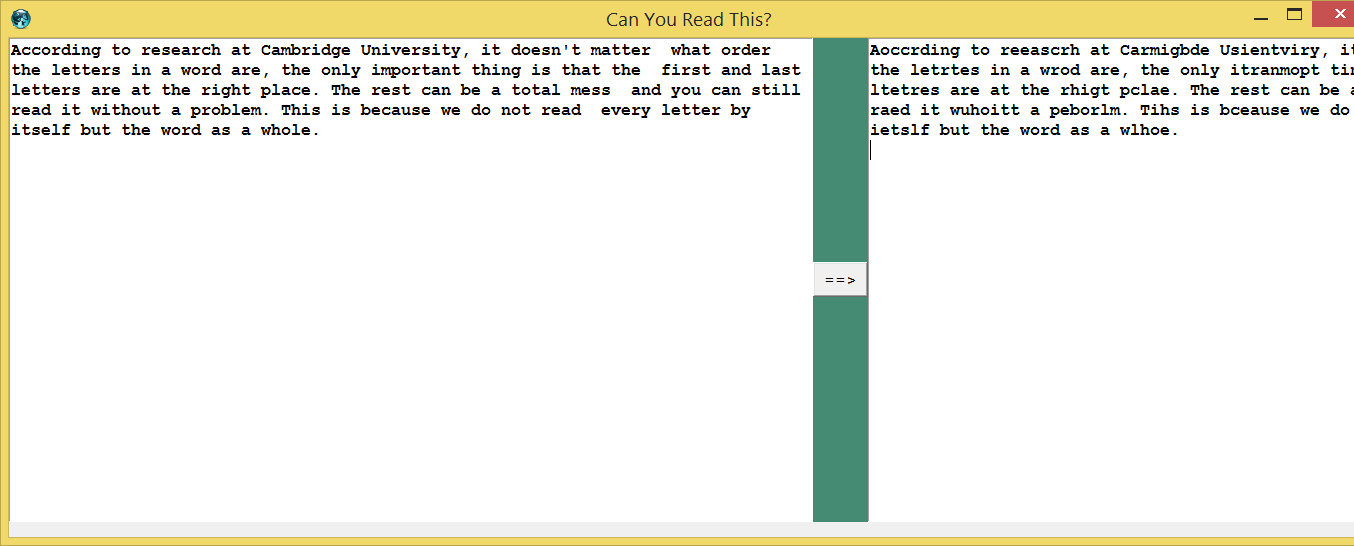Can You Read This?
Keith Vetter 2004-12-18 : On the Snopes Urban Legend site they have the following page [L1 ]:
Acrcndiog to resecarh at Cimdrgabe Unierivsty, it deson't meattr what oderr the lertets in a word are, the only ionramptt thnig is that the frist and last lttrees are at the right palce. The rset can be a toatl mess and you can sitll raed it wutihot a pboelrm. This is becsuae we do not raed every letetr by itself but the wrod as a whloe. save me to do a revision
Here's a little whizzlet that lets you play with this.
##+########################################################################## # # CanYouReadThis.tcl -- Mixes up all but the first and last letter in a word # by Keith Vetter, December 18, 2004 # package require Tk package require textutil set S(title) "Can You Read This?" set txt "According to research at Cambridge University, it doesn't matter \ what order the letters in a word are, the only important thing is that the \ first and last letters are at the right place. The rest can be a total mess \ and you can still read it without a problem. This is because we do not read \ every letter by itself but the word as a whole." proc DoDisplay {} { global S wm title . $S(title) text .ptext -wrap word .ptext configure -font "[font actual [.ptext cget -font]] -size 10 -weight bold" text .mtext -wrap word -font [.ptext cget -font] button .mix -text " ==> " -command Mix .mix configure -font "[font actual [.mix cget -font]] -weight bold" frame .buttons button .quit -text "Quit" -command exit button .about -text About -command About grid .ptext .mix .mtext grid .buttons - - -sticky ew grid x .about .quit -in .buttons -padx 10 -pady 5 grid columnconfigure .buttons 0 -weight 1 grid columnconfigure .buttons {1 2} -uniform a bind all <Key-F2> {console show} .ptext insert end $::txt Mix } proc About {} { set pre "$::S(title)\nby Keith Vetter\nDecember 2004\n\n" set txt "Folklore says that you can understand text even if all\n" append txt "the letters in the words are mixed up provided that the\n" append txt "first and last letters are correct." set txt [MixWords $txt] tk_messageBox -message "$pre$txt" -title "About $::S(title)" } proc Mix {} { set txt [.ptext get 0.0 end] set mix [MixWords $txt] .mtext delete 0.0 end .mtext insert end $mix } proc MixWords {txt} { set result "" # Not the smartest way to split into words but simple and good enough set words [::textutil::splitx $txt {(\W)}] ;# Split into words foreach word $words { set mword [MixWord $word] append result $mword } return $result } proc MixWord {word} { set len [string length $word] if {$len == 0 || [string match " *" $word]} { return $word } set txt [string range $word 1 end-1] set mix [shuffle $txt] set new [string replace $word 1 end-1 $mix] return $new } proc shuffle {str} { set llist [split $str ""] set len [llength $llist] set len2 $len for {set i 0} {$i < $len-1} {incr i} { set n [expr {int($i + $len2 * rand())}] incr len2 -1 # Swap elements at i & n set temp [lindex $llist $i] lset llist $i [lindex $llist $n] lset llist $n $temp } return [join $llist ""] } DoDisplay
AAAAAAAARRRRGGGHHH!!!! YES! I can read this! In fact, I was reading along very quickly yet I was so uncomfortable with what I was reading that my knuckles were white. Someone should research the heart rates and blood pressure of people reading mangled texts like the one your program produces.
Interesting, though, and a good job ;-)
ABU Really impressive ! I've just tried with some phrases in Italian, but the resulting text is not so 'magic', maybe because italian words are longer ... What about other languages ? VK: I saw this trick for Russian, and such an effect exists but with less strength, because most cyrillic letters, unlike Latin, do not go above or below a line (like t,g,l), so they are mostly aligned with a top and bottom lines, so effect is less.
VK: As long as you have such an expression, fellows, you should understand now why Chinese is faster and easier to read... once you have reading experience for years.
UK: This even works for nonnative english readers. But it has limits for languages that use composite words like german. Prime example Donaudampfschifffahrtskapitän trans: danube steamship captain. The resulting gestalt is not distinctive enough.
gold added pix, dimensions problem
See also Shuffled words.
